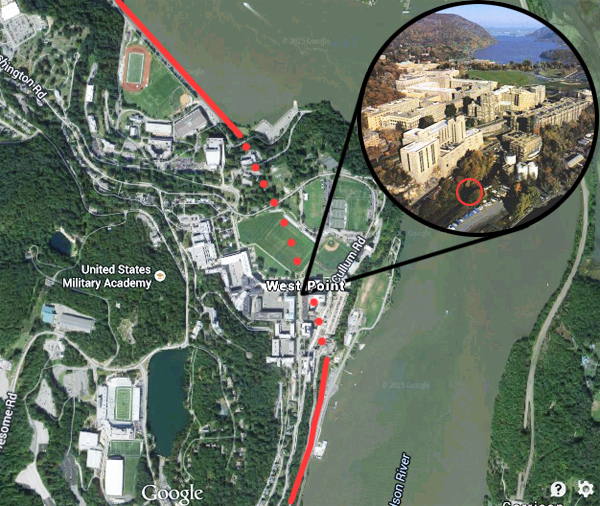The route of oil trains that transport volatile Bakken crude along the Hudson River is often described as running “adjacent” or “past” the U.S. Military Academy at West Point. In fact, it runs under the military campus through a tunnel above which sits: Thayer Hall, the main academic building of more than 100 classrooms, Taylor Hall, which holds the offices of the Superintendent and Dean, Bartlett Hall, which houses the department of nuclear engineering, Johnson Baseball Stadium and the Officers’ Club.

The solid red line indicates the west shore freight tracks along the Hudson River. The dotted line indicates where the tracks run beneath U.S. Military Academy at West Point. The inset picture, which looks north, shows the buildings that occupy the east side of the West Point campus. The south entrance to the tunnel is indicated by the red circle. Illustration by John Cronin; map by Google; photo by USMA
Worry about a catastrophic oil train accident has increased along the Hudson in the wake of two oil train derailments and fires in West Virginia and Illinois over the last four weeks.
On February 16, West Virginia, Governor Earl Ray Tomblin declared a state of emergency after a derailment and explosion caused the evacuation of up to 300 people and the closing of the public water supply. On March 5, 21 of 103 railcars carrying Bakken crude derailed, causing some to burst into flames alongside the Upper Mississipi River outside Galena Illinois. According to the Associated Press, there have been at least 22 major oil rail accidents since 2006. (See EarthDesk, March 6 and February 20).
According to the environmental organization Riverkeeper:
With very little public awareness and no study of environmental impacts, the oil industry has made the Hudson Valley into one arm of a dangerous “virtual pipeline” for crude oil that snakes thousands of miles by rail, barge and ship from oil fields in North Dakota, Canada and elsewhere, to refineries on both coasts.
The New York State segment of this “virtual pipeline” primarily moves a particularly volatile crude oil by rail from the Bakken shale formation of North Dakota and nearby states and provinces, where oil production has doubled in three years, to the Port of Albany. There, billions of gallons of crude oil can be offloaded onto barges and ships destined for East Coast refineries. Additional trains loaded with crude oil destined for refineries to the south continue along the west side of the Hudson River, through communities in Greene, Ulster, Orange and Rockland counties.
To learn more, follow this link.










#Bakken Bomb Train Song https://www.youtube.com/watch?v=R-PPBNsJS1A By Kris Kitko #ND #StabilizeBakkenCrude
“If members of the group ISIS somehow infiltrated the United States and set off explosions with the same intensity in the same spots, certain political figures and CNN anchors might have a nervous breakdown on your TV set. But no, it’s just our own Big Oil and Big Rail doing their business…keep calm and carry on.”–Will Bunch
http://www.philly.com/philly/blogs/attytood/On-next-mayors-to-do-list-Oil-bombs.html
###
“The state’s (North Dakota) three-person Industrial Commission seems likely to adopt a set of industry-designed best practices. Simply put, North Dakotan crude will have to be lightly pressure-cooked to boil off a fraction of the volatile “light ends” before shipment.”
This conditioning lowers the ignition temperature of crude oil—but not by much. It leaves in solution most of the culprit gases, including butane and propane.
Even the industry itself says conditioning would not make Bakken crude meaningfully safer for transportation, though it would make the state’s crude more consistent from one well to another.
The only solution for safety is STABILIZATION, which evaporates and re-liquefies nearly all of the petroleum gases for separate delivery to refiners. Stabilization is voluntarily and uniformly practiced in the Eagle Ford formation in Texas…”–Railway Age
Contact the North Dakota Industrial Commission & demand “STABILIZATION”… and insist that your city & state lawmakers (and firefighters) do the same…
ND Industrial Commission
ndicinfo@nd.gov
701-328-3722